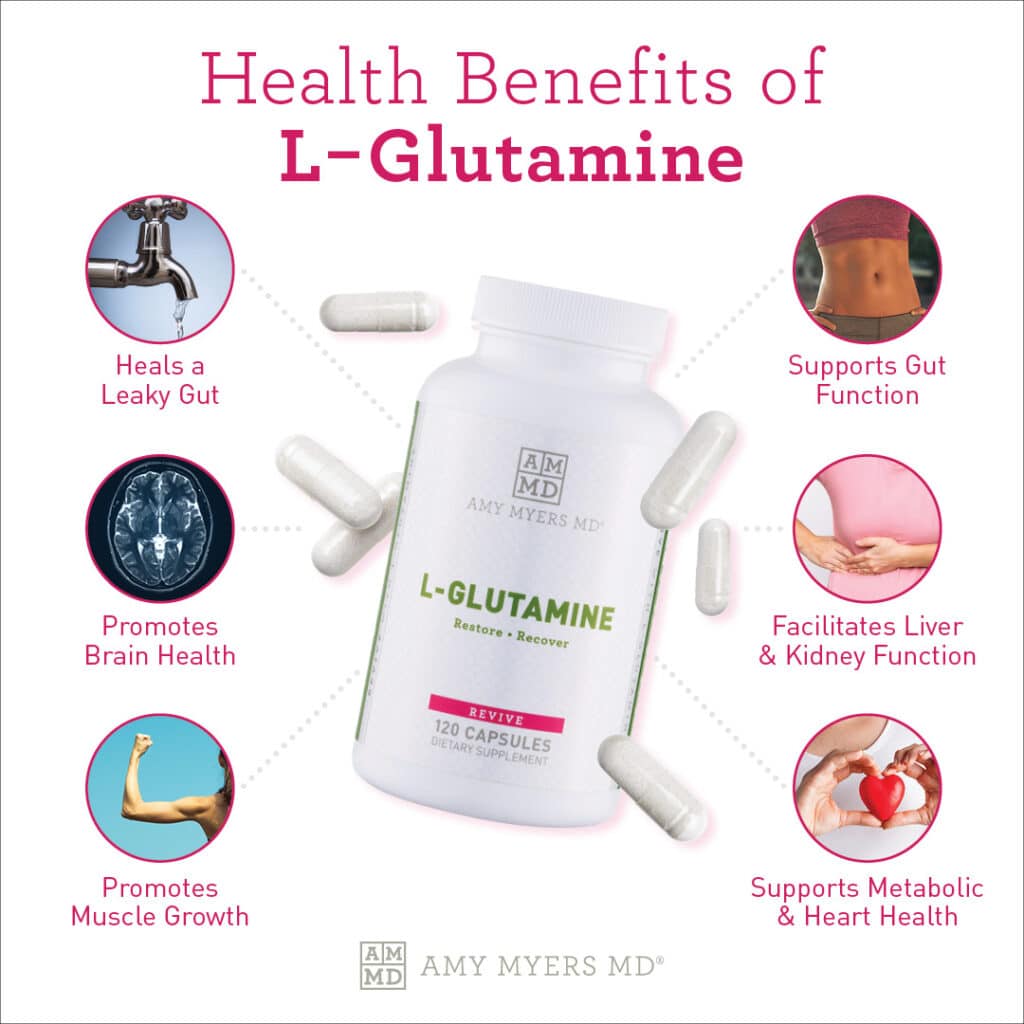Few supplements have proven themselves to repair leaky guts like Leaky Gut Revive®. I wanted to make sure I offered a groundbreaking supplement that actually restored the gut. That’s why, in addition to slippery elm and aloe vera, I included L-glutamine. Using L-glutamine for gut health is just the tip of the iceberg in the broad spectrum of L-glutamine benefits.
L-glutamine is one of the most critical amino acids in your body. This powerful amino acid is your body’s natural cell builder. It’s also a cell rebuilder. However, the benefits of L-Glutamine go beyond your cells. It’s also needed for brain health, liver and kidney function. Additionally, it supports metabolic and heart health1 Athletes are turning to L-glutamine to help with muscle recovery. The benefits of L-Glutamine are quite amazing!
What else can L-Glutamine do for your health? In this article, I’m sharing all the wonderful L-Glutamine benefits. I’m especially focusing on L-Glutamine for gut health. I’ll explain why you might need to supplement this amino acid, and how to ensure you’re getting optimal amounts. Let’s dive in.
Glutamine Benefits
Your body makes L-glutamine from glutamate and ammonia. While it does make L-glutamine on its own, there are circumstances where it becomes a conditionally essential amino acid. Some examples include strenuous exercise or a vegan diet. Chronic stress or poor absorption caused by leaky gut, SIBO, or Candida overgrowth can also occur.
When L-Glutamine becomes conditionally essential, it means your body isn’t making enough. This is when supplementing with L-Glutamine is necessary. First, let’s talk about all the L-Glutamine benefits for the body.
 Dr. Amy Myers
July 11th, 2024
https://content.amymyersmd.com/article/l-glutamine-benefits/l-glutamine benefits – infographic – Amy Myers MD®
Dr. Amy Myers
July 11th, 2024
https://content.amymyersmd.com/article/l-glutamine-benefits/l-glutamine benefits – infographic – Amy Myers MD®L-Glutamine Repairs a Leaky Gut
By far, the most impressive benefit is L-Glutamine for gut health. Think of your gut as a drawbridge. It allows teeny-tiny boats to pass through your intestinal wall and into your bloodstream. These small boats are micronutrients. Certain external factors can break apart the tight junctions in your intestinal wall. Some of the biggest factors include food, infections, toxins, and stress. What this does is it leaves the drawbridge open. Once this happens, you have a leaky gut.
When your gut is leaky, larger boats that were never meant to get through can enter your bloodstream. Your immune system marks these “foreign invaders” as pathogens and attacks them. A majority of these boats include toxins, microbes, and undigested food particles.
Leaky Gut is the number one cause of autoimmune disease. To reverse your autoimmune condition, you must start by repairing your gut. This is where L-glutamine comes in.
L-glutamine helps maintain a healthy intestinal lining by supporting gut barrier function. It also encourages cell reproduction. By enabling your (gut cells to regenerate faster, L-Glutamine helps seal tight junctions. In effect, this restores your gut lining back to an optimal state. These repairs are essential for reversing leaky gut. As your gut heals, symptoms disappear. You also reduce your risk of associated chronic conditions.
L-Glutamine Supports Gut Function
L-Glutamine for gut health is obvious, yet it goes beyond only repairing a leaky gut. L-glutamine is beneficial for other gut disorders and conditions. This is partly due to its ability to promote mucus production. Those with irritable bowel syndrome (IBS), Crohn’s disease, or inflammatory bowel disease may benefit greatly from this.2 The mucus in your intestinal wall helps maintain a healthy gut microbiota. This mucus helps reduce bacterial overgrowth in the intestine.3
L-glutamine’s primary function is to provide the building blocks of protein. Since the gut rapidly depletes L-glutamine, supplementing can help restore your gut lining to a healthy state.
Additionally, L-glutamine supports muscle function, which helps the body resolve intestinal spasms. When stressed, the body releases cortisol, which can then lower the levels of L-glutamine stored in the muscle tissue. People with stress-induced IBS may find that increasing their intake of L-glutamine mitigates the impact of cortisol, thereby improving muscle function and reducing spasms.
L-Glutamine Promotes Brain Health
One of the more fascinating benefits of L-glutamine is how it promotes brain health. Glutamine is a precursor to glutamate, a key neurotransmitter that promotes brain function and regulates mood. This is the glutamine-glutamate cycle, which is important because it provides neurons with astrocyte-generated glutamate/y-aminobutyric acid (GABA).
GABA is known for producing a calming effect.4
Disruption of the glutamine-glutamate cycle can lead to mood disorders. Examples include bipolar disorder, anxiety, depression, and addiction.
Additionally, L-glutamine may also have a role in supporting brain function. Some research suggests that glutamine supplementation may improve cognitive function in people with traumatic brain injury or sclerosis.5
L-Glutamine Supports Muscle Recovery
One reason athletes incorporate L-glutamine is due to its ability to enhance performance. L-glutamine also supports muscle recovery.6
A common misconception is that muscles develop during exercise. The process starts during exercise, yes. However, muscle building happens during rest. Repetitive weight resistance exercises create microtears in the body. After you work out, your body replaces the damaged cells with new ones. This happens when it fuses muscle fibers to form new proteins during rest periods.
For this process to occur, your immune system sends cells to your muscles. These cells help it produce a protein that enhances the formation of new muscle fibers.7 If your immune system is not functioning properly, it cannot make these cells.
I’ve talked about how L-glutamine is important for gut health. Gut health and immune health go hand in hand. After all, 80% of your immune system lives in your gut. L-glutamine can benefit your gut and muscle recovery as well as your immune system.
Facilitates Liver and Kidney Function
Your liver and kidneys are detox champions. They help remove waste and deliver nutrients to your blood. These filters for your body act like an oil filter for your car. Your liver’s main job is to regulate chemical levels in your blood.
L-glutamine also supports lower lipid peroxidation in the liver. Lipids are fatty molecules that are insoluble in water. They function as chemical messages and also store energy. Lipid peroxidation is when free radicals steal electrons from lipids in the liver, causing damage. L-glutamine also supports this process by facilitating the production of glutathione. Glutathione is a compound your liver uses to remove toxins from your body. It also repairs cells damaged by oxidative stress.
Your kidneys are your body’s biggest user of ammonia (NH3). The kidneys use ammonia to maintain an acid-base balance in your kidneys. Your kidneys then send ammonia to your urine or store it in your renal vein to keep that balance.
Kidney disease can lead to a buildup of acid in the body. L-glutamine is the most important donor of NH3 to the kidneys, and NH3 helps maintain the kidneys’ pH balance.
L-Glutamine Promotes a Balanced Insulin Response
One of the better-known benefits of L-glutamine is that it helps regulate blood glucose levels. It does this by directly introducing glucose into the bloodstream. L-glutamine also promotes insulin production in the pancreas.
Some studies suggest supplementing with L-glutamine supplementation can cause hypoglycemia, especially after exercise. If you have type 1 diabetes, talk with your doctor before taking L-glutamine supplements.
L-glutamine also reduces sugar cravings. Protein slows the release of sugar into your bloodstream. Not enough protein can cause your blood glucose levels to rise and fall at an abnormal rate. This rollercoaster causes sugar cravings. L-glutamine has the same properties as protein, which can help curb sugar cravings.
Now that you know the broad spectrum of L-glutamine benefits, let’s discuss why you might need to supplement and how to ensure you’re getting enough.
Why You Would Need to Supplement Glutamine?
I talked about how L-Glutamine is a popular supplement among athletes. However, did you know L-Glutamine supplements were first used as a fitness supplement? When your body is under constant stress, such as that from intense exercise, it will quickly use up its natural L-Glutamine reserves. Yet, there are several reasons why someone may need to supplement glutamine.
People with certain medical conditions may have difficulty absorbing nutrients. Some of the most common include inflammatory bowel disease, Crohn’s disease. IBS, ulcerative colitis, and celiac disease are also on the list.
If you’ve been injured or had surgery, your doctor may recommend you take L-Glutamine supplements. Natural L-Glutamine levels can become depleted after surgery or injury. Remember, L-Glutamine facilitates cellular growth and synthesis of the building of protein.
Moreover, people who follow a vegan or vegetarian diet may have lower levels of glutamine. This is due to the fact L-Glutamine is in many animal products.
If your body is using up all your L-Glutamine, it could lead to deficiency. Here are three signs you could have low levels of L-Glutamine:
- sudden weight loss
- persistent fatigue
- increased colds or illnesses
How can you ensure you’re getting all the L-Glutamine benefits? There are several ways you can get optimal amounts. Let me explain.
How to Support Glutamine Levels
L-glutamine isn’t one of the four essential supplements I recommend for everyone. However, if I were adding a fifth to that list, it would be L-glutamine. The high amounts of stress we face in our modern society wreak havoc on our gut. By now you know that gut health impacts our overall health. High levels of stress can quickly deplete L-glutamine in the body.
The recommended optimal daily intake of L-glutamine is 2,000 to 5,000 milligrams. If you are a long-distance runner or suffer from chronic stress, increase the dosage to 10,000 mg daily.
You can reap all the L-glutamine benefits in my Leaky Gut Revive®. It contains gut-repairing ingredients such as marshmallow root and aloe vera and 2,000 mg of pharmaceutical-grade L-glutamine. If you want a delicious flavor and to repair your gut, try Gut Revive® Strawberry Lemonade!
If you have IBS, Crohn’s, or inflammatory bowel disease, I recommend Leaky Gut Revive® Max. It’s also great if you want maximum support. It has everything you’ve already come to love and depend on in Leaky Gut Revive®, with an added boost of GI defense and intestinal support from ImmunoLin®.
L-Glutamine capsules are great if you’re seeking to support brain health, kidney and liver function. Each capsule contains 850 mg of pharmaceutical-grade L-Glutamine. I take it every day!
The Final Word on L-Glutamine Benefits
Using L-Glutamine for gut health is only the tip of the iceberg when it comes to L-Glutamine benefits. While your body makes this on its own, certain circumstances may require supplementation. If you’re an athlete, deal with chronic stress, and gut distress, or eat a vegan or vegetarian diet, supplementation of L-Glutamine is crucial. Enjoy better gut and overall health with Leaky Gut Revive® today!
Article Sources
- Glutamine: Uses, Side Effects, and More. WebMD. 2023.
- Breath test for differential diagnosis between small intestinal bacterial overgrowth and irritable bowel disease: An observation on non-absorbable antibiotics. I Esposito, et al. World Journal of Gastroenterology. 2007.
- The Role of Glutamine in the Complex Interaction between Gut Microbiota and Health: A Narrative Review. Simone Perna, et al. International Journal of Molecular Sciences. 2019.
- Gamma-Aminobutyric Acid (GABA). Cleveland Clinic. 2023.
- L-Glutamine for Multiple Sclerosis. Blue Rose Pharmacy. 2018.
- Glutamine: Metabolism and Immune Function, Supplementation and Clinical Translation. Vinicius Cruzat, et al. Nutrients. 2018.
- How the immune system helps build muscle. Sanford Burnahm Prebys. 2016.
